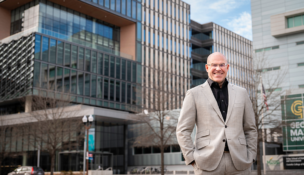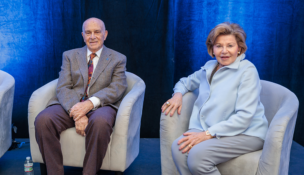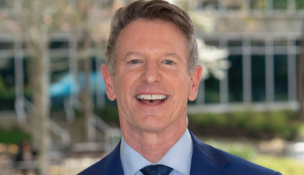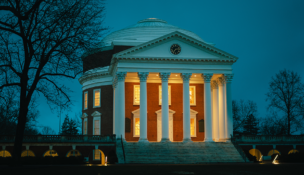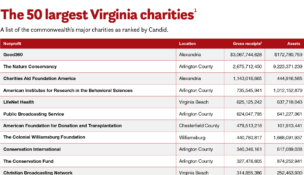Maroon Mentors
Program matches students with school’s alumni
Tim Thornton //December 30, 2016//
Today’s college students may be more savvy than their predecessors, according to Jonathan Lee, a 1995 Roanoke College graduate and the college’s director of alumni and family relations.
Technology has made information readily available to current students, Lee says, and they are better at using that technology and taking advantage of other resources. They’re also more willing to ask for help. But today’s college students share at least one trait with virtually every college graduate who came before them. “I don’t think they realize how little they know,” Lee says.
That has become one more thing that the liberal arts college will try to teach its students. “We sort of came to realize students need as much guidance as possible to succeed in the real world,” Lee says.
Lee and his colleagues also realized Roanoke College’s alumni offered a ready-made network of people who could provide that guidance, so Lee — along with Director of Career Services Toni McLawhorn and Career Advisor Kelly Dalaski — developed a way to connect students with that network. The 175-year-old college’s Maroon Mentors program targets sophomores but also pairs juniors and seniors with alumni who’ve spent some time in the business world and are willing to share what they’ve learned.
Insight on a career
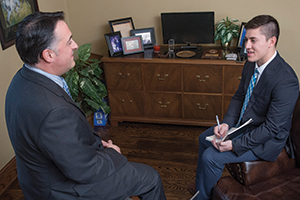
He also thought about how great it would have been if someone had done this for him, how much time he would have saved in developing his career. Ultimately, Devlin became a mentor to Luke McCollester, a sophomore from Rochester, Mass., who came to the college as an athletic training major.
McCollester says his first biology class convinced him he’s not a science person but he has always liked math. Now he wants to get an MBA, become a CPA and go into wealth management. “Maybe open my own business,” McCollester says. “I’ve always been interested in being an entrepreneur.”
McCollester’s time with Devlin has given him some insight into what that business is like. Devlin and five other people — one of whom is also a Roanoke College graduate — founded Market Square Advisors more than three years ago. The wealth management company contracts with Freedom First Credit Union as well as serving its own clients.
Roanoke College suggests that mentors meet with students at least two or three times a semester. Lee says ideally that would include an introduction session, a mock interview, job shadowing and possibly an internship.
With Devlin and McCollester, the process began with a meeting at Mac & Bob’s (a restaurant owned by a Roanoke College graduate). “We just went and grabbed a long lunch, and we just chatted,” Devlin says. “We just kind of went with the flow. “
“We kind of hit it off really well,” McCollester says. Devlin didn’t want to do things halfway, McCollester says. They discussed ways McCollester could use the skills he developed during a marketing and web design internship last summer to work on a project for Market Square Advisors.
McCollester says he shadowed Devlin, watching how he dealt with clients with very different concerns. The company deals in wealth management, McCollester says, but Devlin showed him, “You’re in the people-helping business.”
Since that first meeting, McCollester says, he and Devlin have communicated almost weekly, and McCollester expects that will continue. “I definitely think Steve and I will keep this relationship going,” McCollester says.
Helping two women
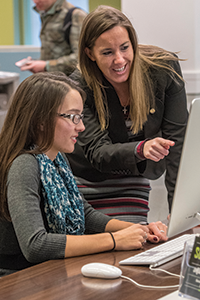
She helped Sloman with job shadowing years ago. Since then Hammer has assisted Sloman with interviews and other career challenges. Hammer was especially keen to help because she knew how difficult it could be for a woman to break into her business.
When she joined Merrill Lynch, she was the only female financial adviser in her office. Hammer’s childhood — she describes herself as a tomboy and a daddy’s girl with three brothers — prepared her for working with men. “A few of them, I think they’ll tell you I made them be my mentor,” she says. “I kind of bullied them into it.”
In addition to Sloman, Hammer is also mentoring Cassidy Drew, a sophomore from Atlanta. “I really like that I’m able to talk to somebody who’s in the business world,” Drew says, “just because there’s so much difference between the classroom and the real business world.”
She met with Hammer a couple of times last semester, including a mock job interview. Hammer says she wanted to go through that exercise before they got to know each other too well to make it more like a real interview.
Drew says the mock interview was very useful. She learned something about how she acts in that situation. “I fidget a lot,” she says. “It’s usually those little things you don’t notice until someone points them out.”
Drew’s parents have a consulting company that finds art for businesses to place in board rooms, reception areas and hotel rooms. Her parents work with several Fortune 500 companies, Drew says.
She likes the variety in that work. “Every project is something new and different,” Drew says, “and I really like that. “
Drew says she’s leaning toward a career in marketing, perhaps on “the creative side.” (She’s taking a graphic design class.) She likes having a mentor who works in finance because it’s “good to get different perspectives.”
Drew’s not sure about the immediate future of her mentorship because she is applying for a Rotary scholarship, which could mean she’ll spend a semester as an exchange student at the University of Oslo. She’s not completely sure about that marketing career, either. “I still have plenty of time to figure it out,” Drew says.
The mentorship will be even more valuable in her junior and senior years, Drew says, because she’ll have someone to help connect her with people in the working world and somebody to bounce ideas off.
Plenty of volunteers
Lee says the ultimate goal is for every student at Roanoke College to have a chance to have a Maroon Mentor to help them make those connections and discuss those ideas. The mentorship program was limited to business majors when it began two years ago. This academic year, the program was opened to all majors. Last semester, 42 of the college’s roughly 450 sophomores were in the program.
There’s been no problem finding potential mentors, Lee says. Whenever he travels for Roanoke College, graduates offer to mentor students. It sounds like a cliché, Lee admits, but he insists it’s true, “People here really care a lot about each other.”
And those mentors rarely have problems connecting with the students, Lee says. “I think part of it is we are a small school,” he says, “so there are a lot of commonalities, even if there are 10 or 15 years between them.”
Coaches and professors tend to stay at Roanoke College, Lee says, so mentors and students may have had the same classes taught by the same people.
Lee says studies and anecdotal evidence shows many companies are looking for employees who can think on their feet, exercise critical thinking and adjust to changing circumstances. In short, most employers prefer liberal arts graduates.
“They realize,” Lee says, “that a person with a liberal arts degree can take projects and run with them and be flexible.”
Even so, Lee says, the education available to students through Maroon Mentors can develop and amplify one very important lesson some students can’t absorb in a classroom. Mentors who’ve been in the working world know, and may be able to convince students that it’s okay for them to take a chance. It’s okay to fail. Rather than derailing a career, those experiences can be opportunities to learn and grow. “If you have someone mentoring you and guiding you, you feel a little more empowered,” Lee says.
Students and newly minted graduates are sometimes so focused and driven they aren’t prepared for the inevitable stumbles waiting in their career path.
“I think in today’s world there’s so much pressure on students.” Lee says. “What are you going to do? What’s that first job’s salary going to be?” Mentors can let them know, “Things will work out. Keep working hard. Keep moving.”
Students can learn other important lessons from their mentors, too. Lee says one reason the program begins with sophomores is so students can get a close look at what their chosen field is really like. If they’ve picked the wrong path, it’s better for students to learn that early in their academic career rather than the second semester of their senior year.
Students and mentors both can profit from these relationships, but Devlin says the potential benefits extend far beyond that. “I think it’s important if you care about what’s up and coming in the workforce,” he says. “The better we can prepare kids for the job market, the better off our society will be.”
-


